By Judithe Registre, Founder and podcast host
Image source: Pixabay
In last week’s episode of The Get InPowered Podcast (to be continued with Part 2 coming this Thursday), I spoke with Christian Picciolini, an anti-hate activist and author of a nonprofit called Life After Hate.
Christian founded this nonprofit because he spent a good number of his formative years as a member and leading figure of neo-Nazi groups. Now, he is applying this life experience and journey into his activism work. Christian’s transformation has been rather unique, to take the experience of hate—that is, being part of a hate movement—to now transforming that hate into activism for social change.
Why is a recognition of our HUMANITY so key to ending extremism, hate and racism?
As someone who has been in the movement, who has lead the movement, and who has been recruited into the movement, Christian has certain insights and perspectives that are relevant and very useful to us in this current time. In my conversation with him, I was reminded that regardless of our race, our gender, our nationality, or how we perceive ourselves and who we are, we have a common thread that binds us all as human beings: Our common humanity. We have needs. I can summarize those needs in a few ways: The need to belong, the need to be heard, the need to be seen in our humanity, the need to matter, the need to be recognized. How common these needs are, and how problematic they can be if they are not met. Some of our biggest social problems are rooted in these few needs. But as Christian reminded me, big problems often have simple solutions, even though we rarely if ever apply those solutions. Racism and extremism are cases in point. The need to be seen in our humanity, and people’s inability or refusal to see the humanity of others, underlies so much of the extremism.
Anger and frustrations as sources of energies and creativities
In talking to Christian, I was also reminded that anger and frustrations can be sources and energies of creativity. They can be used for good or they can be used for evil. When opportunities are available to channel those energies positively, they can lead to transformation and create beautiful, sometimes life-altering things. However, when anger and frustration are not properly managed and the right opportunities are not created, these energies can lead to hate, which can quickly become a path of destruction.
On the other hand, when creativity is met with opportunities, we do see positive transformation. We are currently at a time when fear, anger, and frustration are at an all-time high, and hope activism and a sense of opportunities are at an all-time low. These feelings are both real and perceived. They are perceived in the sense that we also live in a time when we need to create states where we can turn negatives into positives. And hopelessness and lacks of opportunities are shaping the direction of not only how we’re existing day to day, but how we are being led by our leadership. It is an important time for us to figure out how to manage the forces, sources, and energies of fear, frustration, and anger, because these are powerful forces with lots of potential for creating beautiful, positive things.
Racism is by design, which means it can be redesigned
Of course, it would be impossible to talk about a conversation with Christian without addressing racism. It’s important to note that, despite how it may seem, racism is not currently rising it America. Instead, it is seeing itself for what it has always been. Racism is part of the American fabric. That said, racism is by design, which means it can be redesigned. We are in a time of strategic engagement, strategic understanding, and strategic opportunities. The work that Christian is doing to address white rage and white anger and to create spaces for them where they can be properly channeled is a strategic opportunity that we need to figure out how to leverage. I am deeply grateful and thankful that there are people like him out there who are working to transform those energies into something meaningful.
Recognizing our HUMANITY: To be seen, to be heard, to be relevant
Can we live in a world where we can respect each other in our differences and use these differences as sources of creativity and evolution? Well, that is the question that has plagued humanity from the beginning. But here’s the thing. The search for answers to these questions has been the source of human evolution and human progress. So it is an important question for us to continuously find answers to. Every generation is going to show up differently, but the questions and the concerns will consistently be the same. Our search for relevance, our search to be heard, our search for identity, our search to be understood, our search to matter will remain consistently the same. Living in communities has made human evolution possible. It is the reason all of us are where we are today. And that’s exactly why this is such a big challenge.
So as you join us this week in my continued conversation with Christian, perhaps you will find your level of understanding for what it will take to continue to advance us forward, because the opportunities are always there. And as much as we may seem as though we do not have answers and we cannot do anything to change our situation, we are the solutions to the problems we see around us. So let’s join together in this conversation. Let’s see what’s possible.





